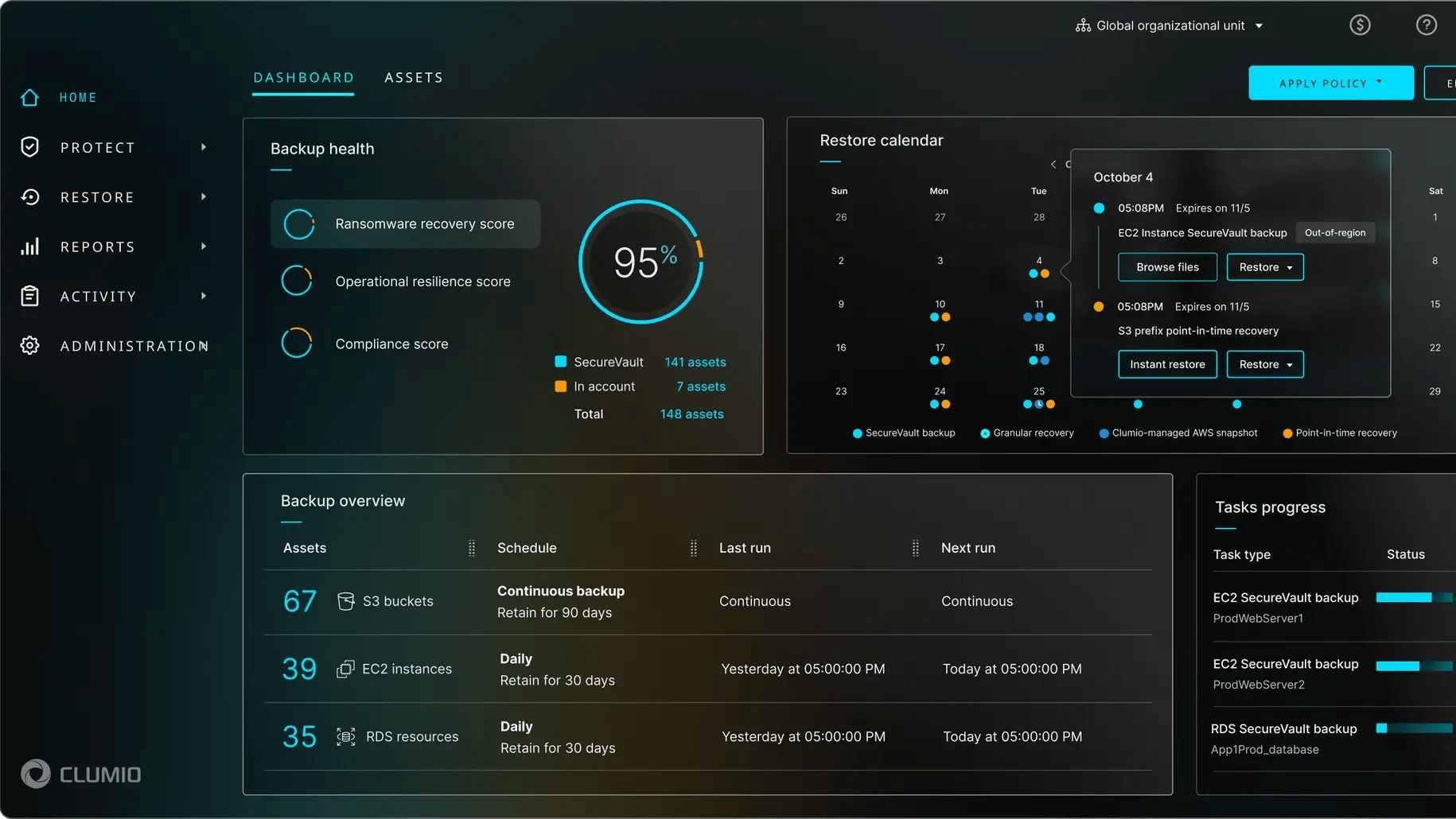Clumio, a data backup and recovery provider for companies using the public cloud, has raised $75 million in a Series D round of funding.
The raise comes as the Santa Clara, California-based company claimed a four-fold increase in annual recurring revenue (ARR) last year, driven by new customers such as Atlassian, which is now using Clumio for the cloud-based incarnation of its Jira project management software.
The problems that Clumio and others like it, such as Veeam and Rubrik, are trying to solve are manifold. While public cloud spending is showing little sign of weaning, businesses also face growing threats related to ransomware, with extortion gangs enjoying a bumper 2023 by most estimations. And then there is the issue of data center disasters like the fire that hit France’s OVH in 2021, leading to millions of websites going offline and significant data loss.
Throw into the mix a growing array of regulations with strict data retention stipulations, and the need for greater transparency in the snowballing generative AI movement, and this all amounts to a fertile landscape for companies like Clumio to flourish, by helping companies to automate their data backup and recovery workflows.
Backed up
Founded in 2017, Clumio largely serves to protect workloads on Amazon’s cloud infrastructure, though it introduced support for Microsoft 365 back in 2020 too. While it’s true that AWS and its ilk offer native data backups spanning areas including replication (where objects are copied across buckets), versioning (where multiple versions of an object are kept in the same bucket) and object locking (storing objects as “write-once-read-many“) this is typically to solve accidental data deletion and over-writes — it typically reverts to the previous version, and restricts how companies can restore objects or an entire bucket (a data storage repository) to a chosen point in time.
Moreover, it’s important to keep production (i.e. “live”) data and backup data in separate secure domains, something that many backup solutions (including first-party from the cloud providers themselves) don’t do. So if there is a breach, and security credentials were to be compromised across an entire organization, this would effectively jeopardize the backups as well as the production data.
“Clumio overcomes this challenge by delivering a default air-gapped, ‘immutable’ platform that keeps enterprises’ data secure from such adversarial incidents,” Clumio CEO Poojan Kumar told TechCrunch by email.

Indeed, Clumio stores its backup data in what Kumar calls a “hyper-optimized data plane” on AWS. “Unlike other vendors, we don’t deploy any heavy file systems or compute in the customer’s account to optimize storage,” he said. “We leverage our serverless data processing engine in AWS to perform all core backup operations. Having said that, we do plan to expand our data plane to other clouds this year.”
On that note, many enterprises actually build applications upon infrastructure spanning cloud providers — for instance, deploying a Microsoft SQL server database on an Amazon EC2 compute instance. This can create a “blank space” in backup coverage, where neither cloud provider is backing up the full stack. This is something that Clumio is increasingly supporting as it expands its coverage across the cloud infrastructure and application landscape.
While Clumio has been substantively AWS-focused thus far, which is perhaps understandable for a startup looking to target the biggest piece of the cloud computing pie from the get-go, Kumar says the platform has been architected in a way that makes it easy to port to any cloud.
“Our mission is to be THE backup solution for any cloud, any workload,” he said. “And this year, we will make progress on that mission. We have started in AWS, but will soon expand to the other key cloud providers as customer demand on those clouds increase.”

Risk landscape
2023 was a hotbed of ransomware activity, with prolific gangs such as Russia-linked Clop exploiting software vulnerabilities to target hundreds of organizations, from hospitals to banks, universities and airlines. But holding data to ransom is just one immediate risk of not having sufficient backup and recovery systems in place, with various rules and standards such as SOC2 and ISO27001 requiring enterprises to store and maintain data for a set period of time for auditing purposes.
And the OVH fire three years ago also demonstrated the importance of a robust data backup regimen, when the French cloud provider was successfully sued by customers who had paid for backups but lost their data because OVH had kept the backups on the same servers as the “live” production data.
On top of that, the fast-moving AI revolution is leading to new regulations such as the EU AI Act, which has strict provisions for traceability so that it’s possible to document the origins of data used to develop a given model — this is important for averting the much-maligned “black box” problem and help make AI more trustworthy. And this could prove to be a boon for Clumio and its ilk, as businesses look to identify, classify and backup datasets preemptively even before regulations have gained much of a foothold.
“With the unstoppable force of generative AI and the immovable focus on privacy, there is enormous flux in the regulatory environment,” Kumar said. “We have some famous genomics customers that are using AI for drug discovery, and they want to do it responsibly because new regulations will require backward traceability for years, perhaps decades.”
Clumio says that it is now “well into” double-digit millions of dollars for ARR, a 400% increase from 2022 to 2023, though it stopped short of giving specific numbers. Prior to now, the company had raised around $186 million, the lion’s share arriving via a $135 million Series C round more than four years ago. While startups’ funding typically increases as they move through their rounds, Clumio’s latest cash injection sits at almost half its 2019 raise — a clear reflection of how the world’s economic landscape has shifted in the intervening years.
“The macro environment is quite challenging — capital is more expensive, and the mantra of ‘grow-at-all-costs’ has developed into responsible growth,” Kumar said. “So, even though we quadrupled ARR and secured net new investors in our cap table, we decided to raise our Series D appropriately.”
Still, $75 million is nothing to be sniffed at, and the capital will be necessary as Clumio seeks to bolster its market reach both in terms of industry coverage as well as its cloud support.
Clumio’s Series D round was led by Sutter Hill Ventures, with participation from Index Ventures, Altimeter Capital and NewView Capital.































Comment